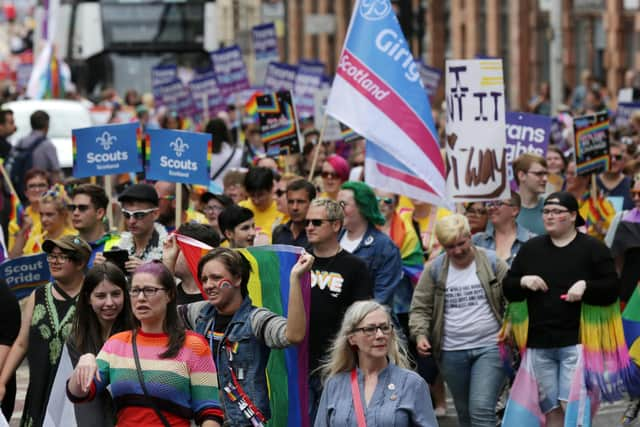Scottish census 2022: Bid to overturn gender self-identify question is rejected
Let us know what you think and join the conversation at the bottom of this article
Lord Sandison ruled the National Records of Scotland' s guidance that people can self-identify their gender, even if they do not have a gender recognition certificate (GRC), is allowed.
In his ruling, he said that an answer provided in "good faith and on reasonable grounds" would not be a false answer.


Advertisement
Hide AdAdvertisement
Hide AdCampaign group Fair Play For Women, which brought the legal challenge, said it was "disappointed by the judgement and will be requesting an urgent appeal".
The group said on Twitter: "The guidance proposes for the sex question will jeopardise the collection of accurate data on sex in the Scottish census and erodes the harmonisation of data collected via censuses across the UK."
Earlier this month, the group argued at the Court of Session in Edinburgh that sex could be changed only with a gender recognition certificate, and what was meant by sex was set out in the Census Act 1920.
It brought the action after it was announced the sex question in the census would contain guidance saying: "If you are transgender you can be different from what is on your birth certificate. You do not need a gender recognition certificate."
In his 32-page ruling on Thursday, Lord Sandison said there is "no general rule or principle of law that a question as to a person's sex may only properly be answered by reference to the sex stated on that person's birth certificate or GRC".
Roddy Dunlop QC, on behalf of the campaign group, had argued the sex question must "be answered truthfully" and "the sex on the certificate provides the true answer to the sex on the census".
Lord Sandison said in his ruling it is "obvious the sex question might be answered falsely" and, for example, a "respondent registered as female at birth, and who has never entertained any concern or doubt about that assigned sex before the census day, might well be providing a false answer by ticking the 'Male' box in answer to the sex question".
He added: "It is much less obvious that a respondent registered female at birth, without a GRC, but who has come to live to all practical intents and purposes as a male, perhaps with a greater or lesser degree of pharmaceutical or surgical intervention, would be providing a false answer by ticking the 'Male' box."
Advertisement
Hide AdAdvertisement
Hide AdVic Calentine, Scottish Trans manager, welcomed the ruling and said: "To change the sex on their birth certificate, a trans woman or trans man has to go through a stressful, lengthy and difficult process of applying for a gender recognition certificate, that often takes many years.
"Yet trans men and trans women can update all of their other identity documents, be seen by family and friends as a man or woman, and be living their lives for many years completely as themselves before applying for one."
A recent poll showed widespread public support to make the legal process of a trans person changing their gender easier in Scotland.
The survey of 2,000 adults carried out by Savanta ComRes for BBC Scotland indicated general support for the move with 57% for and 20% against.